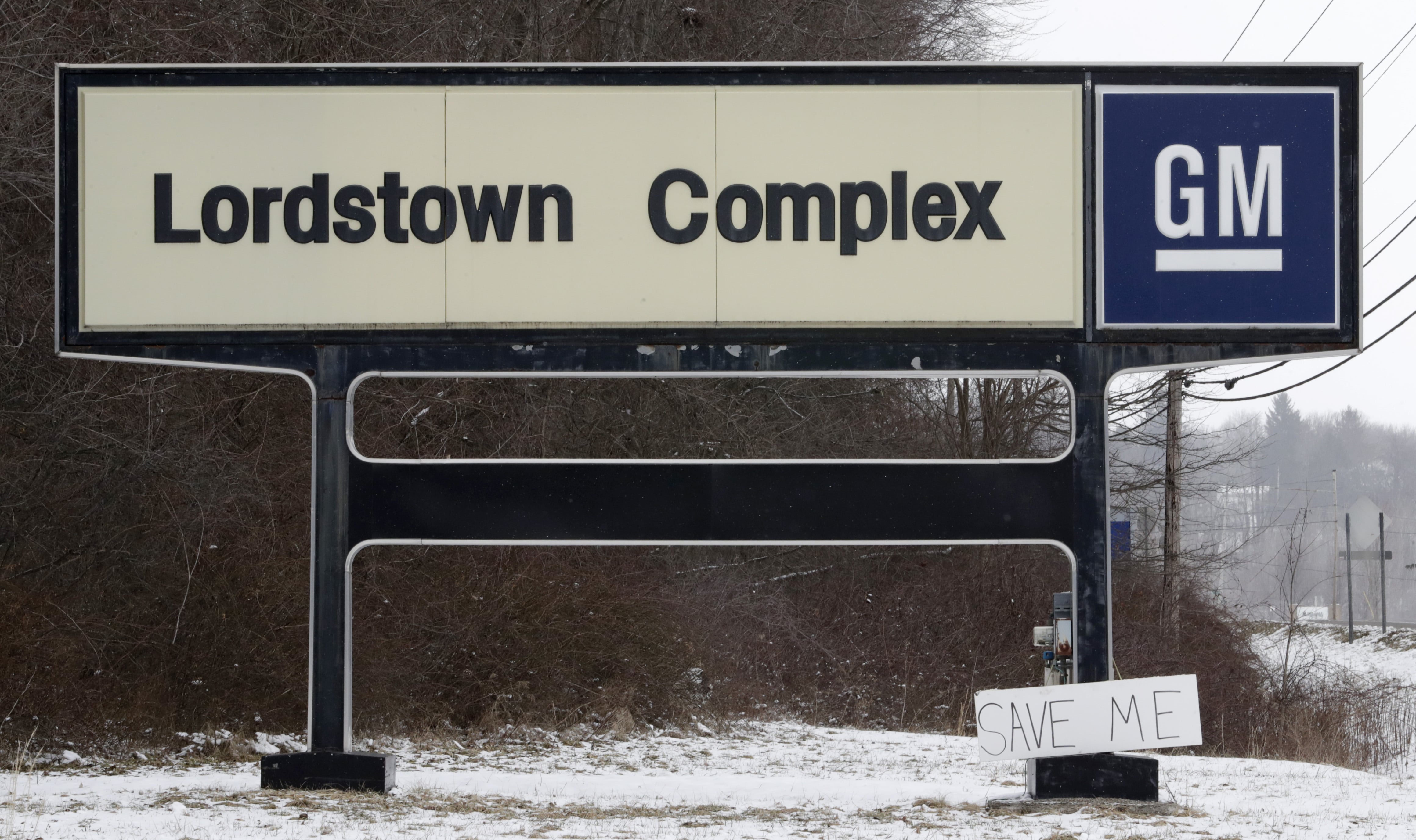Have Democrats Abandoned Ohio Auto Workers to Trump?
Once a manufacturing hub, the city of Lordstown has fallen on hard times. Only a truly radical economic agenda will appeal to its voters. Tony Dejak / AP
Tony Dejak / AP
The vacant Lordstown General Motors facility is a frightening sight—6.2 million square feet of modern industrial might spread over 900 acres doing absolutely nothing except depressing the regional economy and the spirits of northeast Ohio. Just a few months ago it produced the Chevy Cruze and provided thousands of good paying industrial jobs with excellent benefits. Now it’s gone, and unless the Democrats have something meaningful to say about it, they too may be gone.
Lordstown is the poster child for modern financialized capitalism and runaway inequality. It symbolizes the kind of system in which the super-rich reap the rewards and the rest of us pay the price.
This new version of capitalism burst onto the scene when Wall Street deregulation took hold in the early 1980s, but it really came into full view when Wall Street’s insatiable greed took down the economy in 2007. The financial crash put GM on life support, and it quickly became crystal clear that textbook capitalism was a fiction.
Under the supposed rules of free-markets, the corporations that cannot compete successfully should perish—what Schumpeter called creative destruction. In 2007, most of Wall Street’s big banks—as well as GM—would have gone down, but their size and the centrality of these mammoth institutions meant that their rapid demise (without government intervention) would crater the entire economy. They were, instead, the beneficiaries of taxpayer bailouts.
The mythical capitalism of creative destruction is long gone. There are new rules for financialized capitalism. One demands that we the taxpayers must bailout both the biggest Wall Street banks and the largest corporations, like GM, because they are far too big to fail. It’s the ultimate blackmail. Either we pay or we are all economically devastated.
A second new rule of the new capitalism dictates that not only must we bail them out, but we are not permitted to ask for anything substantial in return.
Unlike private investors who provide capital to distressed companies, we taxpayers do not get any ownership rights with our investment, nor do we get a high rate of return on our money. We also do not have a say in how the bailout enterprises do business, nor are we able to remove the predatory executives (and jail the ones who broke the law.) In exchange for our financial guarantees, we are not permitted to demand that a corporation like GM must keep its jobs in the U.S., nor may we insist that they refrain from giving future revenues via stock buybacks to their super-rich investors (who would have earned nothing without our largess). Instead these bailed-out entities are returned to their private owners as soon as possible so that they can again be run by and for the wealthy.
What Did GM Do After We Bailed Them Out?
As soon as GM could amass a sizable profit, it engineered a $5 billion stock buyback to enrich their top officers and hedge fund investors. The pressure for the stock buybacks came from none other than Harry J. Wilson, a former member of the Obama bailout team. On our dime he learned all there was to know about GM, which he then put to work to enrich himself. He formed an investment group of hedge funds to buy up GM shares and when they had sufficient control, demanded the massive stock buyback. He prevailed and walked off with tens of millions of dollars. The financial strip-mining of GM workers and the communities so dependent on the company could then proceed in earnest.
Today, GM is a private enterprise constrained only by its union contracts. Its primary goal is to generate as much cash flow as possible in order to dole out more stock buybacks to enrich super-wealthy elites and its top officers who are paid through stock incentives. That cash comes from slashing U.S. jobs and outsourcing as much production as possible to low wage areas around the world.
These corporate executives made a cold-blooded decision that the Chevy Cruze, although profitable, would not generate as much profit as SUVs and trucks. So they shut down Lordstown entirely, along with several other U.S. facilities.
There was an alternative. They could have put the new Chevy Blazer into these idle facilities. But instead they decided that more cash for stock buybacks could be generated by assembling the Blazer in Mexico.
What Is the Democratic Party’s Response?
For nearly a generation, the corporate wing of the Democratic Party has aided and abetted this financial strip-mining. Starting with Bill Clinton they have led the charge to deregulate Wall Street and promote trade deals that make it easier and easier to shift production abroad. They poured and drank the Wall Street Kool-Aid, which claimed the rise of financialized capitalism would bring riches to us all. Instead, manufacturing collapsed, the average worker wage stalled and the CEO/worker wage gap rose from 45 to 1 in 1970 to an obscene 800 to 1 today.
Some liberal Democrats just throw up their hands and say there’s nothing much that can be done about all of this. Globalization is here to stay and automation is killing these jobs anyway. So the best we can do is provide retraining and cash subsidies for those who have been left behind.
Other liberals seem worry that if we try to keep these jobs in the U.S. we would be taking jobs away from poorer workers in less developed nations. In effect they seem to believe that financialized capitalism is some kind of philanthropic organization designed to uplift the poor, rather than a machine designed to enrich elites.
Still others argue that we should not cater at all to these manufacturing workers who are largely white males (but, actually less so each year). Instead they argue that Democrats should worry about women, people of color and the LGBTQ communities who will never work in the declining manufacturing sector.
Warning: Any candidate arguing anything like the above positions should stay clear of Lordstown.
The Fatalistic Fallacy
What unites these positions is an erroneous dogma. The decline of manufacturing in the U.S. is not an inevitable product of the global economy, no matter how often that false narrative is repeated by politicians and pundits. Germany, for example, is far more dependent on global trade than the U.S. and it has as least as much automation. Nevertheless, manufacturing in Germany is nearly twice as large as a percentage of their economy—20.66 percent as of 2016 compared to only 11.6 percent for the U.S economy. And German workers earn more. The total compensation for a German manufacturing worker is $43.18 per hour versus $39.03 in the U.S.
Manufacturing jobs declined in the U.S. because both political parties joined hands in facilitating Wall Street deregulation, tax cuts on corporate and financial elites, and anti-worker trade deals that make it easier and easier to ship jobs abroad.
Do Progressive Democrats Have a Plan?
It’s not easy to come up with a fix for Lordstown, Carrier and thousands of other profitable facilities that have been shuttered. To do so requires changing the most fundamental rules of financialized capitalism, something that only Bernie Sanders has so far addressed. Let’s think back to how it might work in the case of GM.
It’s 2007 and GM is on life support. The government offers a $50 billion bailout. In exchange, however, “We the People” then set terms for this bailout:
- No stock buybacks, period.
- No profitable facility shall be shut down, ever.
- As long as GM is viable, the current number of workers must be maintained in the U.S. or GM will lose any current and future government contracts, tax credits and state/local subsidies.
- CEO salaries can be no higher than 12 times that of its average employee.
- Unions, the government and community stakeholders shall have seats on the board of directors (as in Germany)
In effect this would be saying that any too-big-to-fail corporation that is bailed out becomes a joint enterprise among key stakeholders. In the case of banks, they would become public banks like the Bank of North Dakota.
That would have stopped the closing of Lordstown and many other GM facilities. Writ large it would dramatically increase the production of decent paying jobs all over the U.S and reduce some of the financial strip-mining that produces runaway inequality.
Anything short of this—like praying another company will take over these mammoth facilities—will seem hollow to those who have been crushed by this process.
The choice is clear: Either we have the courage to interfere with financialized capitalism or we will once again abandon these workers to demagogues like Trump.
Your support is crucial...As we navigate an uncertain 2025, with a new administration questioning press freedoms, the risks are clear: our ability to report freely is under threat.
Your tax-deductible donation enables us to dig deeper, delivering fearless investigative reporting and analysis that exposes the reality beneath the headlines — without compromise.
Now is the time to take action. Stand with our courageous journalists. Donate today to protect a free press, uphold democracy and uncover the stories that need to be told.






You need to be a supporter to comment.
There are currently no responses to this article.
Be the first to respond.